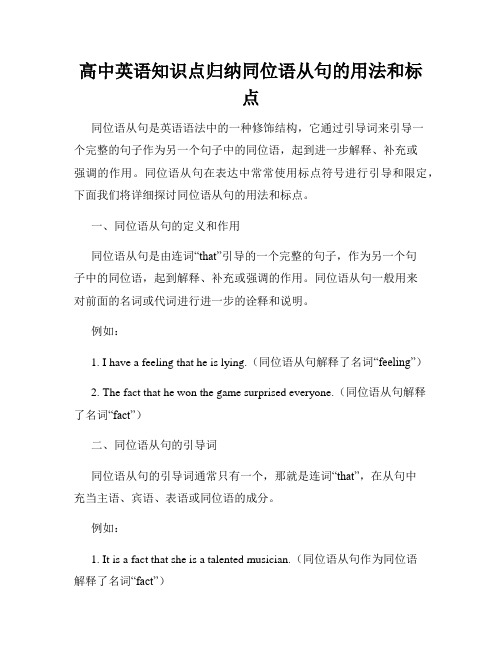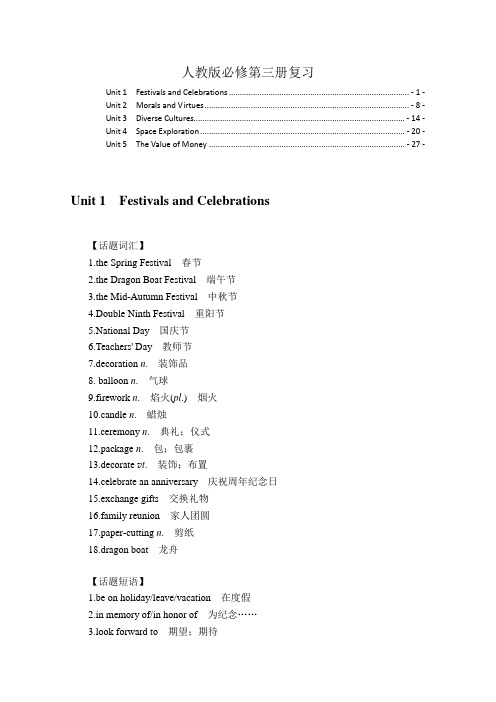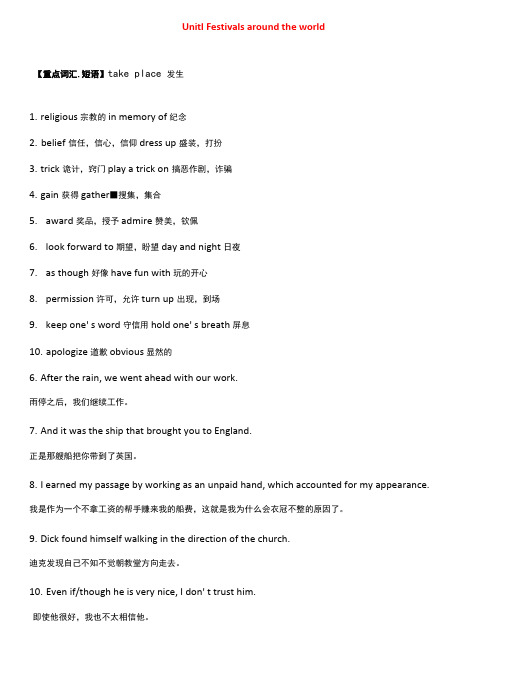人教版高中英语【必修三】[知识点整理及重点题型梳理] 同位语从句
人教版高中英语必修三语法总结

人教版高中英语必修三语法总结高中英语必修三语法主要考点有情态动词、名词性从句、同位语从句等,下面是具体的高中英语必修三语法,仅供参考。
1英语必修三有哪些语法要学考点一情态动词(unit1,unit2)一、情态动词的特点:1.没有人称和数的变化。
2.有些情态动词有过去式的变化:e.g.will→would,can→could,may→might,dare→dared二、情态动词的否定式:情态动词+not+动词原形cannot:can’t,mustnot:mustn’t,neednot:needn’t三、情态动词的用法及相互区别,是考试的内容之一1.can,beabletobeableto表示经过努力后,能够做到;beableto有多种形式的变化。
can1).表示体力或脑力方面的能力;2).表示允许、可能性。
could是can的过去式,表示过去有能力及过去存在的可能性;用于疑问句表示委婉地提出问题。
1)Thefirespreadthroughthehotelveryquicklybuteveryone____getout.(NMET97)A.hadtoB.wouldC.couldD.wasableto2)-Willyoustayforlunch?-Sorry,__.Mybrotheriscomingtoseeme.(NMET99)A.Imustn’tB.Ican’tC.Ineedn’tD.Iwon’t2.may表示询问或说明一件事可不可做;表示某事有可能发生。
might是may的过去式;用在疑问中比may委婉、客气。
1)-MayItakethisbookoutofthereading-room?-No,youmustn’t.(Yes,youmay.)2)-MightImakeasuggestion?-Yes,youmay.3.must1).表示必须要做的事:必须2)表示很有把握的推断:一定,准是。
have(has)to:have(has)gotto必须,不得不。
高中英语知识点归纳同位语从句的用法和标点

高中英语知识点归纳同位语从句的用法和标点同位语从句是英语语法中的一种修饰结构,它通过引导词来引导一个完整的句子作为另一个句子中的同位语,起到进一步解释、补充或强调的作用。
同位语从句在表达中常常使用标点符号进行引导和限定,下面我们将详细探讨同位语从句的用法和标点。
一、同位语从句的定义和作用同位语从句是由连词“that”引导的一个完整的句子,作为另一个句子中的同位语,起到解释、补充或强调的作用。
同位语从句一般用来对前面的名词或代词进行进一步的诠释和说明。
例如:1. I have a feeling that he is lying.(同位语从句解释了名词“feeling”)2. The fact that he won the game surprised everyone.(同位语从句解释了名词“fact”)二、同位语从句的引导词同位语从句的引导词通常只有一个,那就是连词“that”,在从句中充当主语、宾语、表语或同位语的成分。
例如:1. It is a fact that she is a talented musician.(同位语从句作为同位语解释了名词“fact”)2. The teacher said that we need to study harder.(同位语从句作为宾语解释了动词“said”)三、同位语从句的标点同位语从句的标点主要是通过逗号或冒号进行引导和限定。
具体使用哪种标点符号,取决于同位语从句的位置和上下文的语气。
1. 当同位语从句与先行词之间具有较强的逻辑关系,且从句不易省略时,通常用逗号进行分隔。
例如:1. The news, that he got admitted to Harvard, made his parents proud.2. The fact, that she is always late for class, annoys the teacher.2. 当同位语从句与先行词之间的逻辑关系较弱,且从句比较长、独立性较强时,通常用冒号进行分隔。
人教版高中英语必修三导学提纲:U5 Grammar同位语从句

Unit 5 Canada—“The True North”Appositive Clause(同位语从句)导学提纲Designer: Feng Huilan Supervisors:Teachers in senior 1班级:组名:姓名:使用时间:2018. 04.【学习目标】 1. Get students to know about Appositive Clause.2. To know the difference between Appositive Clause and Attributive Clause.一、了解感知(Learn by yourself)1. What is the appositive? What is appositive clause? ——导2. Underline the appositive clauses and fill in the blanks. ——思1) The thought that they would cross the whole continent was exciting.2) Some people have the idea that you can cross Canada in less than five days .3) They forget the fact that Canada is 5.500 kilometres from coast to coast.4) The girls were surprised at the fact that ocean ships can sail up the Great Lakes.5) The question whether we need more time to do the work is not clear.6) I have no idea when he will come back.总结:同位语从句引导词分为:从属连词__________________ ,连接代词__________________,连接副词_____________________,常放在一些抽象名词后面,如___________________________, truth, hope, problem, information, wish,promise, answer, evidence, report, explanation, suggestion, conclusion等,解释说明该名词的具体内容。
人教高中英语必修3Unit5同位语从句(共18张PPT)

(2) 用whether不用if
(3) 其他特殊疑问词
【注意】doubt+ whether; no doubt + that
(1)They were all very much worried over the
fact_t_h_a_t_ you were sick.
(2)He made a proposal t_h__a_t_ the meeting be put
off. (3) I have
no
idea
w__h_y_
he
was
late.
(4)We are looking into the question w__h__e_t_h_e__rhe is
worth trusting.
(5) I have the doubt w__h_e_t_h_e_rhe will come.
forward.
B
A. what B. that C. when D. as
(3)She heard a terrible noise,____
brought her heart into her
mouth.(MET91)
B
A. it B. which
C. this D. that
考例 They have no idea at all _____ .
A where has he gone B where did he go C which place he has gone D D where he has gone
考例:Along with the letter was his
promise _____ he would visit me this
新教材人教版高中英语必修第三册全册书重点单词短语句型汇总(2022新高考一轮复习资料)

人教版必修第三册复习Unit 1Festivals and Celebrations .................................................................................. - 1 - Unit 2Morals and Virtues ............................................................................................. - 8 - Unit 3Diverse Cultures................................................................................................ - 14 - Unit 4Space Exploration ............................................................................................. - 20 - Unit 5The Value of Money ......................................................................................... - 27 -Unit 1Festivals and Celebrations【话题词汇】1.the Spring Festival 春节2.the Dragon Boat Festival 端午节3.the Mid-Autumn Festival 中秋节4.Double Ninth Festival 重阳节5.National Day 国庆节6.Teachers' Day 教师节7.decoration n. 装饰品8. balloon n. 气球9.firework n. 焰火(pl.) 烟火10.candle n. 蜡烛11.ceremony n. 典礼;仪式12.package n. 包;包裹13.decorate v t. 装饰;布置14.celebrate an anniversary 庆祝周年纪念日15.exchange gifts 交换礼物16.family reunion 家人团圆17.paper-cutting n. 剪纸18.dragon boat 龙舟【话题短语】1.be on holiday/leave/vacation 在度假2.in memory of/in honor of 为纪念……3.look forward to 期望;期待4.dress up 打扮;装扮5.turn up 出现;到场6.celebrate the festival 庆祝节日7.have fun with 玩得开心8.of good/poor quality 质量好/坏9.a display of fireworks 烟火表演10.hold one's breath 屏息;屏气【话题佳句】1.What we love most is the time when the whole family enjoy the full moon together.我们最喜爱的是一家人一起赏满月的时刻。
人教版高中英语必修三同位语从句

同位语从句编稿:张桂琴审稿:梁晓概念引入:1 I have a dream that one day, all roads will be made plain.我梦想着总有一天所有的道路都是平坦的。
2 We hold this truth to be self-evident that all men are created equal.我们认为这些真理都是不言自明的,所有的人生来都是平等的3 Some people hold the opinion that the Internet is a curse.有些人持这种观点,互联网是一种诅咒。
4 Museums play a role of education for the simple reason that they provide people with a good opportunity to have a deeper understanding of their own country's tradition and cultures.博物馆发挥教育的作用,原因很简单,他们为人们提供一个很好的机会,对自己国家的传统和文化有更深的了解。
语法讲解一、在复合句中用作同位语的从句叫同位语从句。
它一般跟在某些名词后面,用以说明该名词表示的具体内容。
I heard the news that our team had won.我听到了我们队获胜的消息。
二、可以跟同位语从句的名词通常有news,idea,fact,promise,question,doubt,thought,hope,message,suggestion,words(消息),possibility等(一般的抽象名词都可用)。
I’ve come from Mr. Wang with a message that he won't be able to see you this afternoon.我从王先生那里来,他让我告诉你他今天下午不能来看你了。
人教版高中英语必修3重点词汇、短语、句型、语法大全

Unitl Festivals around the world【重点词汇.短语】take place 发生1.religious 宗教的in memory of 纪念2.belief信任,信心,信仰dress up盛装,打扮3.trick诡计,窍门play a trick on搞恶作剧,诈骗4.gain获得gather■搜集,集合5.award奖品,授予admire赞美,钦佩6.look forward to 期望,盼望day and night 日夜7.as though 好像have fun with 玩的开心8.permission 许可,允许turn up出现,到场9.keep one' s word 守信用hold one' s breath 屏息10.apologize 道歉obvious 显然的6.After the rain, we went ahead with our work.雨停之后,我们继续工作。
7.And it was the ship that brought you to England.正是那艘船把你带到了英国。
8.I earned my passage by working as an unpaid hand, which accounted for my appearance. 我是作为一个不拿工资的帮手赚来我的船费,这就是我为什么会衣冠不整的原因了。
9.Dick found himself walking in the direction of the church.迪克发现自己不知不觉朝教堂方向走去。
10.Even if/though he is very nice, I don' t trust him.即使他很好,我也不太相信他。
【语法总结】名词性从句在句子中起名词作用的句子叫名词性从句(Noun Clauses),名词性从句的功能相当于名词词组,它在复合句中能担任主语、宾语、表语、同位语等,因此根据它在句中不同的语法功能,名词性从句又可分别称为主语从句、宾语从句、表语从句和同位语从句。
高中英语人教版必修三第五单元语法:同位语从句

高中英语人教版必修三第五单元语法:同位语从句Unit 5 Canada--The True North同位语从句(The Appositive Clause)(一)同位语同位语:一个名词(或其它形式)对另一名词或代词进行说明,这个名词(或其它形式)就是同位语。
1.W e Chinese people are brave and hardworking.(名词做同位语)我们中国人是勇敢勤劳的。
2.Y esterday I met Tom ,a friend of my brother’s.(短语做同位语)昨天我遇到汤姆,他是我哥哥的朋友。
3.W e heard the news that our team had won .我们听到了我们队赢的消息。
(句子做同位语)(二)同位语从句:在复合句中,用作同位语的从句,叫同位语的从句。
它一般跟在某些名词(fact ,idea, news , possibility ,promise等)的后面,用以说明或解释前面的名词。
eg The news that our team football team won the match was encouraging.我们足球队赢了比赛的消息令人鼓舞。
(三)同位语从句引导词连词:that(无词义),whether(是否)连接代词who/ who(谁), whose(谁的),what (什么),which (哪一个)连接副词when(什么时候),where(哪里),why (为什么)how(如何)1.that(1)that引导同位语从句,本身无词义,在从句中不做成分,但不可省略。
We heard the news that our team had won .我们听到了我们队赢的消息。
(2)that引导同位语从句常用句式:1)There is no doubt that+同位语从句。
毫无疑问...There is no doubt that our environment isbecoming worse and worse.毫无疑问我们的环境变得越来越糟糕。
- 1、下载文档前请自行甄别文档内容的完整性,平台不提供额外的编辑、内容补充、找答案等附加服务。
- 2、"仅部分预览"的文档,不可在线预览部分如存在完整性等问题,可反馈申请退款(可完整预览的文档不适用该条件!)。
- 3、如文档侵犯您的权益,请联系客服反馈,我们会尽快为您处理(人工客服工作时间:9:00-18:30)。
人教版高中英语必修三知识点梳理重点题型(常考知识点)巩固练习同位语从句概念引入:我们已经学习了名词性从句中的其它三个从句:主语从句、宾语从句和表语从句,本单元我们将较详细地了解一下同位语从句的用法,并梳理名词性从句的几个常用连接词使用时的需注意的一些方面。
下面先研究一下这些句子:1 I have a dream that one day, all roads will be made plain.我梦想着总有一天所有的道路都是平坦的。
2 We hold this truth to be self-evident that all men are created equal.我们认为这些真理都是不言自明的,所有的人生来都是平等的。
3 Some people hold the opinion that the Internet is a curse.有些人持这种观点,互联网是一种诅咒。
4 Museums play a role of education for the simple reason that they provide people with agood opportunity to have a deeper understanding of their own country's tradition and cultures. 博物馆发挥教育的作用,原因很简单,他们为人们提供一个很好的机会,对自己国家的传统和文化有更深的了解。
这些句子中都含有一个同位语从句,你找到了吗?而且都是that引导的从句,说明前面的名词,如句1中的dream,句2中的truth。
语法讲解同位语从句1. 在复合句中用作同位语的从句叫同位语从句。
它一般跟在某些名词后面,用以说明该名词表示的具体内容。
I heard the news that our team had won.我听到了我们队获胜的消息。
Where did you get the idea that I could not come?你在哪儿听说我不能来?2. 可以跟同位语从句的名词通常有news,idea,fact,promise,question,doubt,thought,hope,message,suggestion,words(消息),possibility等(一般的抽象名词都可用)。
I’ve come from Mr. Wang with a message that he won’t be able to see you this afternoon.我从王先生那里来,他让我告诉你他今天下午不能来看你了。
(2015 陕西高考) There is the belief that, if you arrive at an appointment late, you will be considered important. This is a mistaken view. 有这样一种观点:如果你约会迟到,别人会认为你很重要。
这是个错误想法。
3. 英语中引导同位语从句的词通常有连词that,whether,连接代词what,who。
连接副词how ,when ,where等。
(注:if ,which 不能引导同位语从句。
)He must answer the question whether he agrees to it or not.他必须回答他是否同意这样一个问题。
4. 在suggestion,advice,request,order等意为“建议;命令;要求”的名词后,同位语从句中的谓语动词通常用“should +动词原形”的虚拟语气结构,句中的should可以省略。
Our teacher gave us some advice how we (should)use the computer.老师给我们提出了一些如何使用电脑的建议。
There was a suggestion that Brown should be dropped from the team.有一项建议是布朗应该离队。
5. 有时同位语从句可以不紧跟在说明的名词后面,而被别的词隔开。
The thought came to her that maybe she had left the door open when she left home.她突然想起可能在她离开家时没把门关上。
同位语从句-引导词同位语从句的引导词,引导同位语从句的词语通常有连词that,whether,连接代词和连接副词等。
1. 连词that引导同位语从句(注:that不能省略)The idea that you can do this work well without thinking is quite wrong.你认为不动脑筋就能做好这件工作的想法是完全错误的。
(作idea的同位语)注意:引导同位语从句的连词that通常不省略,但在非正式文体中也可以省去。
He grabbed his suitcase and gave the impression he was boarding the Tokyo plane.他拿起了手提箱,给人的印象是他要登上飞往东京的飞机了。
2. 连词whether引导同位语从句(注:if不能引导同位语从句)The question whether we should call in a specialist was answered by the family doctor.我们是否请专家由家庭医生来定。
3.连接代词what ,who ,whom ,whose,引导同位语从句1) I have no idea what size shoes she wears.我不知道她穿几号的鞋。
(what作定语)2) The question who will take his place is still not clear. (who作主语)4. 连接副词引导同位语从句连接副词when ,where ,how ,whyWe haven’t yet settled the question where we are going to spend our summer vacation.到哪儿去度暑假,这个问题我们还没有决定。
【名词性从句(二),367116,同位语从句】同位语从句与定语从句的区别1.意义的不同同位语从句是用于说明所修饰名词的具体内容的,与被修饰词通常可以划等号;而定语从句是限制所修饰名词的,其作用是将所修饰的名词与其他类似的东西区别开:We are glad at the news that he will come. 听到他会来的消息我很高兴。
(that从句说明news的内容,是同位语从句)We are glad at the news that he told us. 听到他告诉我们的消息我们很高兴。
(that从句说明是哪一天消息,是定语从句)2. 引导词的不同what, how, if, whatever 等可引导名词性从句,但不引导定语从句。
3. 被修饰词语的区别同位语从句所修饰的名词比较有限,通常有hope, wish, idea, news, fact, promise, opinion, suggestion, truth等,而定语从句所修饰的名词则非常广泛。
4. 引导词的功能上的不同that引导同位语从句时,不充当句子成分;而引导定语从句时,作为关系代词在定语从句中作主语或宾语。
如上例中that he told us中的that就充当told的宾语。
5. 引导词when,where,why1)when和where 引导定语从句时,通常只修饰表示时间和地点的名词,代替先行词在从句中作时间或地点状语;而引导同位语从句时却不一定,在从句中表示“在什么时候”和“在哪里”。
I have no idea when they will come. 我不知道他们什么时候会来。
I’ll never forget the days when I lived there.我不会忘记我住在那里的日子。
2)why引导定语从句,通常只修饰名词the reason,在从句中代替作原因状语;而why引导同位语从句时则不一定,译成“为什么”。
Can you tell me the reason why you won’t go there?你能告诉我你不愿意去那里的原因。
He repeated the question again why I wouldn’t go there.他又重复了那个问题:为什么我不愿意去那里。
3)引导定语从句时,它们叫做关系副词,在从句中充当状语,可以转换成"介词+关系代词"的形式;引导同位语从句时,它们叫做连接副词,在从句中充当状语,但不能转换成"介词+关系代词"的形式。
例如:①I will never forget the day when I joined the army.我永远也忘不了我参军的那一天。
②We have no idea when she was born.我们不知道她是什么时候出生的。
在句①中,划线部分是定语从句,when在从句中作状语,可以转换成on which的形式;在句②中,划线部分是同位语从句,when在从句中充当状语,但不能转换成“介词+关系代词”的形式。
③This is the house where I lived two years ago.这是我两年前住的房子。
④He put forward to the question where the meeting would be held.他提出会议将在哪里举行的问题。
在句③中,划线部分是定语从句,where在从句中作状语,可以转换成in which的形式;在句④中,划线部分是同位语从句,where在从句中充当状语,但不能转换成"介词+关系代词"的形式。
⑤This is the reason why she will not attend the meeting.这就是她不会参加那个会议的原因。
⑥The teacher had no idea why Jack was absent.在句⑤中,划线部分是定语从句,why在从句中作状语,它可以转换成for which的形式;在句⑥中,划线部分是同位语从句,why在从句中充当状语,但不能转换成“介词+关系代词”的形式。
6. 引导词who,whom①The boy who is playing football is my classmate.正踢球的男孩是我的同学。
